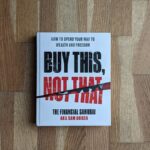In 2005, Pete Adeney, a 30-year old engineer retired from his day job. Financially independent — he would never have to work another day in his life. Since then, he’s raised a son, worked on projects purely out of interest, donated hundreds of thousands to charity, and written a world-famous blog.
Pete still maintains his blog — Mr. Money Mustache — till today. In quite a few ways, he inspired me to write mine. Mr. Money Mustache (MMM) is also widely seen as a leading figure of the Financial Independence Retire Early (FIRE) movement. It’s a growing group of enthusiasts all over the world who aspire to retire early, by saving and investing large amounts of their incomes.
One MMM article I’ll always remember is “The Shockingly Simple Math Behind Early Retirement.” “What, I don’t actually have to work until I’m 60? I can have this dream life where I’m still young, and do whatever the fuck I want till I’m gone?”
It was a pivotal moment in my life. From that point onward, I viewed my money and career choices in a totally different light. And while I wouldn’t consider myself a FIRE advocate today (I’ll probably never retire myself), I’ve continued to learn from the FIRE movement over the years.
Here’s seven things I think you would benefit from knowing too.
1. What Is Financial Independence?
Financial Independence (FI) is this cool concept where you have enough money invested, that you don’t actually need to work anymore.
A cruder way of calling it is having “F.U. Money.”
The younger you reach F.U. Money, the cooler it is, because obviously who wants to say F U to their job only when they’re 60? Get there by 45, and it’s a pretty sweet life. Do it when you’re in your 30s, and you can get featured on CNBC.
What really blew my mind about FIRE was philosophically it had never registered in my mind that people could retire young. I always assumed that everyone needs to work till they have white hair and back problems.
The FIRE movement taught me you could actually FIRE your boss much earlier in life.
How to get there? Let’s dive into the math.
2. How Much Money Do You Actually Need to Retire?
Conceptually, you get to FIRE when:
Your passive income is more than your expenses
So for example, if you have RM 100,000 of investments, and get steady returns of 3.5% per year (EPF-like returns minus inflation), that would mean your passive income = RM 3,500 per year; RM 292 per month. Obviously not enough for anyone to retire on.
But let’s say you’ve saved RM 1,000,000 and again get inflation-adjusted returns of 3.5% per year. Your passive income = RM 35,000 per year; RM 2,917 per month. Assuming you’re not the type who eats lobsters for lunch, livable income for a lot of people.
The interesting thing: if your expenses never exceed RM 2,917 a month, you never touch your capital of RM 1,000,000. You’re living purely on dividends and interest — truly passive income. And since we’ve already factored in inflation, theoretically you could go on like this forever: with a million bucks in the bank, RM 2.9K to spend every month, and never having to set an alarm clock again.
“But what if I want a more luxurious life?
Here’s a quick formula to estimate how much investments you need:
F.U. Money = Monthly expenses x 12 x 30
So if I want to live on RM 5K a month, I’d need RM 1.8 million.

3. Is the Math Really So Simple?
As you can probably tell, the secret to early retirement is keeping your expenses under control, and having lots of investments.
Depending how you adjust these variables, you can even fast forward your retirement date, for example:
- The “easiest” variable to change is your monthly expenses. Like in the example above, if you can live on RM 2.9K, one million is all you need. If you can live on RM 2K (caution: this is below what Bank Negara calls a living wage for a single in KL), the number drops to RM 720,000.
- Percentages matter. In my calculations, I’ve assumed 6% (~average lifetime EPF) returns and inflation of 2.5% per year (past 36 years Malaysian average). If you predict higher returns and lower inflation, you need even less money.
- Traditionally THE NUMBER most finance people use is 4% a.k.a. the 25x Rule — however this is based on US markets and actually designed for traditional retirement: money to last for 30 years. If you’re early-retiring at 35, with 45 years of life to go, a lot more can go wrong.
- There are other assumptions for the math to work, like inflation and investment returns remaining stable, the world not slipping into a mega-depression, and markets not crashing early in your retirement.
As we’ve seen in 2020, things get fucked up every once in a while. There’s no guarantee having 25 years of expenses will be enough forever. But there’s a big margin of safety built into the calculations — so FIRE supporters see it as enough.
In the case of Mr. Money Mustache, both he and his wife saved 65% of their salaries for about 7 years before retiring. At retirement, they had 600,000 USD in investments, a 200,000 USD paid-off house, and were planning to live on ~24,000 USD a year.
4. Managing Your Desires Is Key
More on keeping expenses under control:
If you have expensive tastes, it gets much harder to retire early. As such, you’ll see these concepts show up frequently in the FIRE world: minimalism, frugality, and simple living.
Sometimes it leads to trite “Save money on expensive coffee” type of advice. Maybe that’s okay for some people, but what about the coffee lovers who appreciate high-quality beans? Extreme views always get attention, but practical, realistic ones lead to long-term success.
My take is everyone should figure out what brings value to their lives, and spend their money accordingly. You’re not gonna be able to splurge on everything (unless you wanna drown in debt), but you can probably splurge on a few important things while still saving money. The key is to figure out what’s important to you.
Personal example: I drive an old second-hand MyVi, because I’m not big on cars, and I loathe how quickly new cars depreciate. But I’ve spent good money on laptops, music equipment, and gifts for family — because that shit makes me happy. I also like luxury watches — so don’t call me a hypocrite if you see me sporting a Grand Seiko one day.
I’m not a huge fan of extreme frugality because I think artificially suppressing desires leads to bad things. Work with your desires instead. Also, I ACTUALLY LIKE SPENDING MONEY. As long as it’s on the right things.
5. FIRE Is Hard
Is FIRE achievable for most people? Honestly, I think it’s incredibly hard.
Here’s an average household in Kuala Lumpur, according to the Department of Statistics:
- Mean (monthly household) disposable income in KL: RM 11,102
- Mean expenses in KL: RM 6,913
- Potential savings per month: RM 4,189
- To retire early (and maintain the same standard of living), your interest income must be at least RM 6,913/month
- Assuming 3.5% inflation-adjusted returns:
- Total investments required = RM 6,913 x 12 x 30 = RM 2.49 million
From my compounding calculator here, to reach that magical figure of RM 2.49 million, we would need 29 years of saving RM 4,189 every month.
Of course, reality is gonna be different. Perhaps you earn a lot more than average and your expenses are much lower (good job!) But if anything, the math shows how different someone needs to be if they wanna retire comfortably in their 30s.
Note that many popular FIRE bloggers come from highly-paid industries in rich countries, making >75,000 USD per year. And with the rise of remote working, it’s possible to live in a cheaper country (e.g. spending Rupiah in Bali), while still earning powerful US dollars.
I’m not saying FIRE is impossible; I’m saying you have to be an outlier.

6. Early Retirement Is Not for Me
There’s many things I love about FIRE, but ultimately, I’ve realized it’s not for me.
Although my wife and I make good incomes, our savings rate isn’t extremely high. By my calculations, if I magically maintained my salary and investing rate today, and limited spending to just essentials — I should be able to retire in roughly 8 years.
Actually, if I downgraded more aggressively, I could probably do it within 4. But I’ve thought deeply about it and made a decision: I’m happy to work for much longer.
The truth is, I don’t want to live on a tight budget. I don’t want a life where I feel limited by the financial constraints of my self-chosen retirement. Instead, I want one of abundance — where I can give meaningful money to my parents, support charities I believe in, and splurge on vacations.
Another important factor: both my wife and I want children.
And looking at the high cost of kids (Around RM 40,000/year for 0-6 according to The Edge), and how we’ll likely be the type of parents who spend on them — maybe I’ll only get to financial independence when I’m 50.
7. The Other Side: Why Retire Anyway?
Why is the concept of FIRE so intriguing? I think deep inside every one of us, there’s this desire for absolute freedom. But also, looking back at when FIRE first got me excited — I was at a point where I was feeling meh about my job.
A lot of people are probably in the same boat. If you look at the research, almost 50% employees today are “disengaged.”
But what if you found work you love? What if you could do work that brings meaning to your life, is useful to society, and pays OK?
After a couple of years exploring and a few leaps of faith, I’ve managed to find it for myself. I love my day job. I’m pretty good at it (I think), and I’m proud of what I’ve done with my career. And even if the world suddenly changes, the industry collapses, and I lose my job — I’m confident I’d be able to find something I love again.
Maybe that’s why FIRE doesn’t hold so much appeal for me anymore.
I appreciate that loving your job is pretty uncommon too. But if we’re comparing averages, statistically it’s much easier to find work you like than retiring early.
So if you feel like FIRE is unattainable, don’t despair. Perhaps a life where you work a full career can still be good enough.
Finding Balance in Life
Maybe the question of retirement is just a super-complex version of the famous marshmallow test. How long, and to what extent do you delay gratification today for a better tomorrow?
Do you go full minimalist, aim for the highest paying jobs, and invest 66% of your salary — so you can retire in 10 years?
Or take the other extreme: pursue your passion that pays just enough, so you don’t mind working forever. #YOLO
The beautiful thing about life is there are millions of possibilities along the spectrum, and you have every right to pursue a path that makes sense for you.
I’ve decided I want balance — finding satisfaction in my career, hopefully making some good money, and giving my friends and family the best I can every day. If my time on earth was to be somehow cut short, I’d be happy with how I lived. That’s my idea of a meaningful life.
What’s yours?
– – –
Pics from Pexels: Vincent Gerbouin & Asad Photo Maldives




your latest article on “Lifetime Earning & Spending” hand send me back to this Article. Re-reading it again at 2023 and I still find it relevant (to me at least). also, Great Writing.
Quick question tho, ever thought of Publishing Book out of these Article Compilations? 🙂
Thanks a lot YH!
Yeah definitely thought of writing a book about all my previous experiences and (hopefully) wisdom.
Would you buy it if I wrote one? 😀
You have nailed it. Well written, Mr Stingy!
Thanks Guna!
Well written … like your candid writing
f.i.r.e. May not be suitable for everyone. It is usually the few that able to make it….and chances for those who make it may want more or find it hard to stop. Bigger fire then huh if you know what I mean. Best of luck to you and keep up the good articles…
Thanks Jeffrey,
Appreciate the comments. All the best to you!
Like your writing in a malaysian style.
Thanks!
I came across your blog via some random google search. Though provoking read. Good to see the FIRE movement from a fellow Malaysian perspective. I think it’s uncommon for Asian to talk about early retirement. My parents would have killed me twice before I finish saying the word r.e.t.i.r.e.m.e.n.t.
Thanks Simon,
Appreciate the kind words and wishing you all the best on your journey!
I guess it’s obvious to most, but what does the acronym RM stand for?
Hi Mark,
Thanks for dropping by! That’s “Ringgit Malaysia” which is the name of the local currency. I’m based in Kuala Lumpur, Malaysia.
Hi Mr. Stingy,
Love the fact that you are one of the few in Malaysia who blogs about FIRE. Like yourself, I too was inspired by Pete Adeney (“a.k.a. Mr. Money Moustache”), and have been on a 10 year journey towards FIRE. I recently hit my “number”, and have taken a break from work to see if I’d enjoy the FIRE lifestyle. Married, expecting a baby otw and feel that now is the right time enjoy the FIRE lifestyle for a while.
The greatest perk of FIRE is free time. Free time is a much better luxury product to have than a Mercedes Benz or a big bungalow house…at least thats my view. Another often overlooked benefit of being financially independent (even if you dont want to retire nescessarily, ie. the FI part of FIRE) is achieving leverage with your employer. Asking for special work arrangements, better salary etc. is quite daunting for most employees if you are not in a position to walk away from your job. But knowing that you are financially independent, psychologically you will be willing to be much in tougher in negotiations with employers… and often times able to get what you want from them.
I think the greatest thing about FIRE is not really the “retire early” part, but the ability to be flexible regarding work, and not feel forced to work under terms and conditions or a job you do not like. I think this is what we really yearn for, the freedom to work on our own terms, not nescessarily to stop working completely.
I personally used the 4% rule to achieve FIRE, using a combination of Msian stocks/regional stocks/global stocks/Real Estate/FD to achieve FIRE.
The three pillars of FIRE are: reducing expenses, investing and earning.
Expenses: The good thing about practicing FIRE in Malaysia is that cost of living can be low, if one can control desires for fine dining, expensive booze, expensive travel etc. The basics of life in Malaysia (a simple meal, water, electricity, internet etc.) are affordable when compred to global price levels.
Investing: Investing today is global, and we can own some of the worlds best companies’ stocks just sitting at our laptops right in our Malaysian homes. Earning the 4% return post inflation is very doable over the long term, as long as one is disciplined.
Earning: The challenge in Malaysia I think is that a lot of companies dont pay well relative to global standards, and hence the building the income side of the FIRE equation is not as easy. Malaysia’s economy is not growing like it used to, and hence wages have stagnated here. I personally had to get this part of the equation done by working abroad.
Lastly, you are 100% right to say that to achieve FIRE you need to be an outsider. One needs to be comfortable “saying no” to the traditional symbols of status- eg. nice car, nice house, working in a high status job, purchasing expensive services etc. Lastly I think its important to note that achieving FIRE is not a binary event, where one day you are financially strapped and the next morning after hitting your number you are financially free. There are various milestones along the way (eg. becoming debt free, becoming 25% on the way to FIRE, becoming 50% on the way to FIRE etc.) where we should celebrate and give ourselves a pat on the back.
Mr. Stingy, I would love to speak more with you about FIRE, if you are so inclined.
Thanks Premrajj for your very detailed and thoughtful comment. Really appreciate you dropping by here.
“I think this is what we really yearn for, the freedom to work on our own terms, not nescessarily to stop working completely.” <-- this part is very valuable. On a further conversation regarding FIRE, feel free to drop me your further thoughts via email? Thanks again.
As usual, a good read and informative. Thanks for sharing! 🍎
Thanks so much Adrienne, I hope you’re doing well!
Interesting post, appreciate your honesty. You may find this article interesting. Go to “Get Rich Slowly” website and do a search for “We didn’t start the FIRE.” (Although if you do it now 8/25, it should be on the home page). He goes into detail about how old the ideas behind FIRE movement really are. Contrary to popular belief, it is not a recent idea.
Thanks so much for sharing Suzie. That was a fascinating read!
Where is the like button?!
Thank you for writing this! I think sometimes the idea of FIRE is stressing me up (yes it might be achievable with really extreme lifestyle which gave me despair lol)
I find myself often depress when I achieve certain savings goal, it’s like I can’t see the end of it (I’m in late 20’s)
Lately I’m thought “ok I know I won’t want to retire early, I enjoy having a day job”, to convince myself it’s ok to spend on expensive thing as long as it brings meaning to my life.
(still convincing though hahaha)
Thanks Sunny for your kind words! There’s really nothing with working a “full” traditional career. Whatever you do with your life, as long as it doesn’t hurt others and brings meaning to your life — do it!
Hi Aaron, I’ve just discovered your blog (via Says) and I do find this article so relevant to what I’m going through now (aside from wanting to resign soon). I’m on the same boat as you – if I were to find a job that I love (which has yet to come) then for sure I would work until the day I can’t as I’m not one to idle about! Anyway, I’ve enjoyed reading your posts and keep it up! So off I go hunting for THAT job now LOL!
Thank you so much Susan for your kind words. I really wish you the best in your career journey and finding what’s meaningful for you!